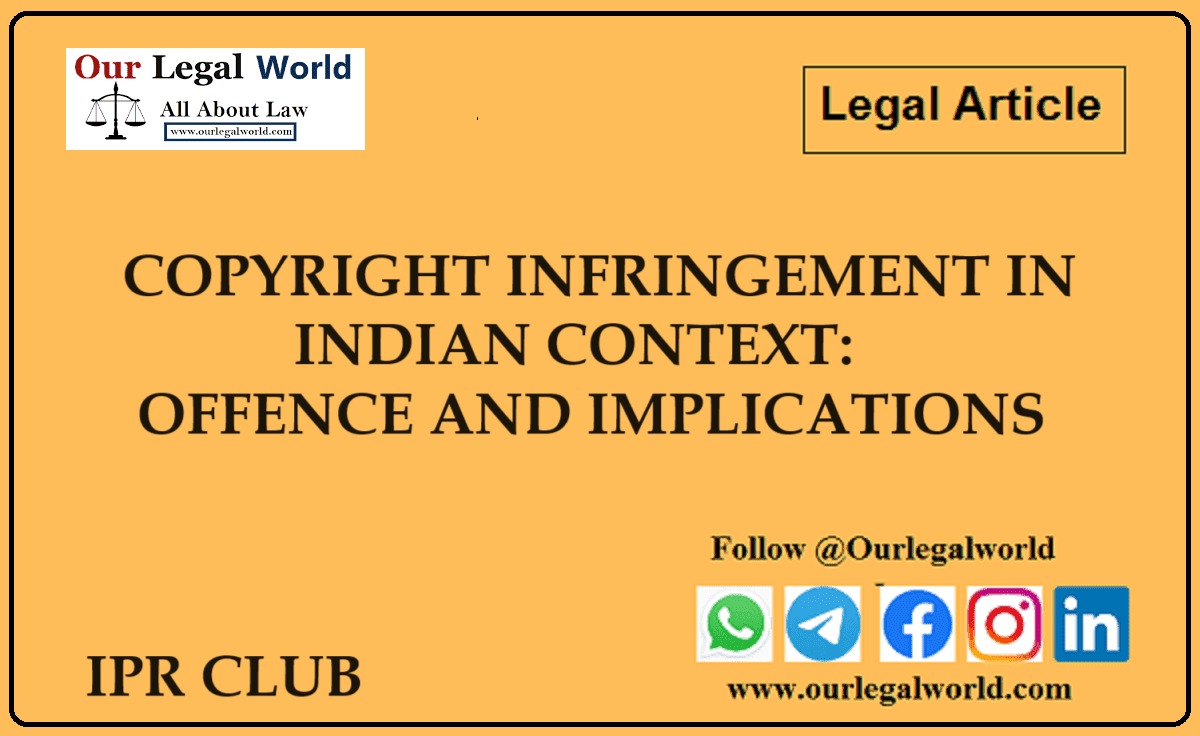COPYRIGHT INFRINGEMENT IN INDIAN CONTEXT: OFFENCE AND IMPLICATIONS
Written by Anshima Agarwal { NLU Delhi)
Imagine that you spent 3 years writing a book. A film director reads it, adapts it into an enormous hit, and makes a fortune off of your hard work and originality. Can you do anything?
What is a Copyright?
Copyright refers to the legal right of the owner or author over his Intellectual Property. This “right to copy”, in other words, means that the original creators of products and anyone they give authorization to are the only ones with the exclusive right to reproduce the work.
The types of works protected by copyright include computer programmes, software, databases, ads, and technical drawings, in addition to books, music, paintings, sculptures, films, and other innovative works.
In India, the Copyright Act of 1957, governs the laws relating to copyright protection. It provides the owner not only with economic rights arising from the commercial use of the product but also moral rights (paternity and integrity right) over their “original” work. The protection intends to make sure that the owner exclusively enjoys the rewards of their investment and labour.
What is Copyright Infringement?
The right to reproduce, distribute, display or perform the protected work, or to make derivative works, rests solely with the copyright holder. Any use of such work without permission, amounts to infringement, provided that it does not fall under the category of permitted use under Section 52 of the Copyright Act.
Section 51 explains when is a copyright infringed:
Primary Acts of Infringement
- When, without the owner’s or registrar’s licence, a person does something that he is not authorised to do or violates the terms of a licence that has been granted.
- If any person permits any place to be used for communication of the work to the public for profit, such communication amounts to infringement.
Secondary Acts of Infringement
- Making, selling or letting any infringed copies of the work.
- Distributing any infringing copies of the work.
- Exhibiting in public, any infringing copies of the work by way of trade.
- Importing into India (not for personal use) infringing copies of the work.
In all, copyright infringement may refer to any of the following actions:
- Making use of the exclusive rights granted to the copyright owner without first receiving their consent, whether concerning the entire work or a significant portion of it.
- Earning profits through providing a space for infringing acts.
- Exhibiting, distributing, and trading illegal copies of the work
Also, to constitute infringement, there should be direct or indirect use of those features of the plaintiff’s works in which copyright subsists.[1]
What remedies are available under the Copyright Act?
The copyright owners have been granted specific remedies in the event of a violation, outlined in Chapters XII and XIII of the 1957 Act. They are civil, criminal, and administrative remedies.
Conflicts over copyright infringement generally settle through negotiations or civil court litigation (remedy being injunctions and damages). Serious commercial infringement is punished through the criminal justice system, especially when it involves counterfeiting. While civil proceedings are preventive, remedial or compensatory, criminal proceedings are primarily punitive.[2]
An Overview of Criminal Remedies
“Desi Boys”, a story by Shyam Rao Devkatta, was submitted to the “Film-writers Association” for registration. Soon after, a trailer for the film titled ‘Desi Boyz,’ was released and he filed a complaint about the copyright infringement of the title ‘Desi Boys’, under Section 482 of the Cr.PC, Section 63 of the Copyright Act, and Sections 406 and 420 of the Indian Penal Code. It was declared by the SC that a film’s title does not qualify it as a ‘work’ for classification, since it is not a ‘literary work’.[3]
Section 63 makes copyright infringement an offence, by adding mens rea as an essential ingredient. Such offences shall be tried by no court inferior to that of a Metropolitan Magistrate or Judicial Magistrate of First class, under Section 70.
Criminalization of copyright infringement is necessary for an organization’s legitimacy, reputation, and goodwill against the theft of Intellectual Property. Further, the sanctions serve as a strong deterrent to prevent such illegal acts. These comprise fines, imprisonment, and the seizure and return of infringed copies.
Some of these remedies, as stated under Section 63-69 of the Copyright Act[4], are as follows:
a) When copyright is infringed: As per S. 63, an infringer must serve a minimum of six months and a maximum of three years in prison, as well as pay a fine of not less than 50,000 rupees that may extend to two lakh rupees. Also, if the copyright is not infringed for commercial objectives, the court may impose a sentence of less than six months, or a fine of less than 50,000 rupees, by mentioning special reasons in the judgement.
- Additionally, under S. 63A, a person convicted for a second or subsequent offence, will face imprisonment for a minimum of one and maximum of three years and will pay a fine of not less than one lakh rupees that may extend to two lakh rupees.
b) Protection in case of technological measures: S. 65A (added by Copyright (Amendment) Act of 2012) states that any person who intends to violate any of the rights granted by this Act and evades the use of effective technical safeguards to protect those rights will be subject to a fine and a maximum two-year sentence in prison.
- S. 63B mentions that a person who knowingly makes an infringing copy of a computer programme may be imprisoned for 7 days to 3 years and be fined Rs. 50,000 to 2 lakhs.
c) Some other provisions under Chapter 13 include penalties for offences like possessing or making plates to make infringing copies of works (S. 65). Under S. 65B, a person faces a two-year prison sentence and a fine if they distribute, import for distribution, broadcast, or communicate to the public copies of any work or performance without authorization and do so while being aware that the electronic rights management information has been removed or modified without permission. The courts can order the disposal of such copies to the rightful owner of the copyright under S. 66.
(The word “plates” refers to the offset printing plates used in printing books.)
d) When false entries in the register are made: A fine or imprisonment of 1 year or both will be imposed on an individual under S. 67 if they make a false entry in the Registers of Copyright.
- Similar punishment will be faced by an individual in an attempt to misrepresent certain details in the register to deceive an authority, as stated in S. 68.
e) When the distribution of content is done without the mention of respective particulars: According to S. 68A, anybody who publishes a sound recording or video film in breach of the conditions outlined in S. 52A will be penalised with a fine and up to three years imprisonment.
For example, the respondent was exhibiting cinematograph films in his Video City for hire or for sale of cassettes to the public that did not contain the particulars envisaged under Section 52-A of the Act. A fine of Rs 10,000 was imposed. [5]
f) Offences committed by companies: Under S. 69 of the Copyright Act, when a company commits an offence under this Act, every person who was in charge of the conduct of the company’s business at the time the offence was committed, as well as the company, shall be deemed guilty of the offence and liable to be prosecuted and appropriately punished; provided that the offence was committed with their knowledge or reasonable care was not exercised.
g) Complaint: The offence of Copyright Infringement under S. 64 is considered a “cognizable” and “non-bailable” offence. It states that any police officer (not below the rank of sub-inspector) may exercise the power to seize infringing copies of work without a warrant.
- Moreover, a complaint can also be filed against the offender to the police or the magistrate under Section 190 of the Code of Criminal Procedure to initiate an inquiry under Section 156 (3).
Since copyright law offences are broad in scope and have the ability to end livelihoods, the rights of innocent people can be better safeguarded by a layer of caution by adding the requirement of a warrant, or permission from a magistrate.[6] This will strike a balance between the rights of the creator and the rights of the user.
Also Read: Copyright Infringement of Songs in Weddings:- IPR Club
Why are criminal remedies not sufficient?
It is crucial to understand that criminal proceedings do not allow the copyright owner to get an injunction; instead, if a convicted infringer repeats the infringement, the proprietor must file a fresh proceeding. Therefore, if the stakes are particularly high, it is recommended that individuals initiate both criminal and civil proceedings.
[1] Divya Sood Proprietor v Renu Bajaj Proprietor [2011] (45) PTC 307 (Del).
[2] 2023 LiveLaw (Kar) 201.
[3] Krishika Lulla and Ors v Shyam Vithalrao Devkatta and Ors MANU/SC/1174/2015.
[4] The Copyright Act, 1957 (14 Of 1957).
[5] State of AP v Nagoti Venkataramana MANU/SC/1267/1996.
[6] <https://www.lexology.com/library/detail.aspx?g=10598b6b-79c5-46f0-8dec-2f75b45d1413> accessed 4 July 2023.








